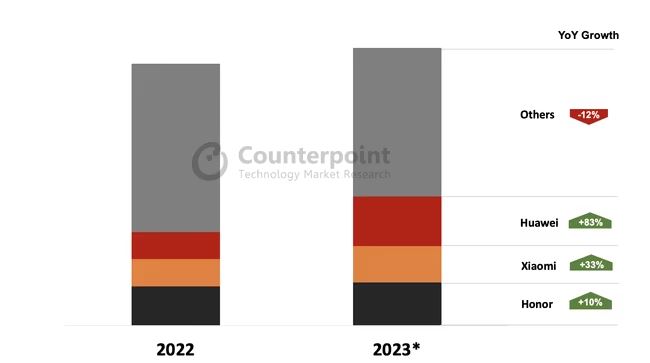Many years ago, Huawei briefly held the title of the world’s largest smartphone manufacturer. Then came the US ban, leading to a decline. However, the Chinese company has now fought its way back up and can boast significant successes, as recent figures clearly show.
Huawei Can Significantly Increase Sales Figures
Since the US ban in 2019, Huawei has faced tough competition in the smartphone market. However, the company has always stated that it would return even stronger by becoming independent of US technologies. This has indeed happened, especially since the introduction of the Mate 60 Pro. In this smartphone, Huawei has once again integrated a Kirin processor and a Chinese 5G modem. Since then, its performance has been exceptional, as indicated by recent figures from Counterpoint:

In October 2023 alone, Huawei reportedly increased its sales in China by 83%. This places the company far ahead in the smartphone market, which grew by 18% in China during the same period. Xiaomi is also making significant gains, largely due to the 14 series smartphones, as recently reported. However, Honor also managed to grow by 10%.
Follow us on Twitter and Facebook
Currently, no one in China can match Huawei. Compared to the previous year, the company nearly doubled its sales figures. According to Counterpoint, Huawei increased its sales by a total of 90 percent compared to the same period in 2022. The new smartphones with their own processor and 5G modem are evidently well-received. It seems people were eagerly awaiting these releases and are now buying them significantly.
Huawei, With A Clear Focus on China
The success in China is slowly propelling Huawei back to being one of the world’s largest smartphone manufacturers. However, these smartphones are unlikely to come to Europe. Without Google services, they would hardly be successful, despite the Kirin processor and 5G modem. In China, other services play a significant role, and Huawei supports these.
Furthermore, Huawei will soon introduce its own operating system, HarmonyOS Next, completely excluding Android apps.





